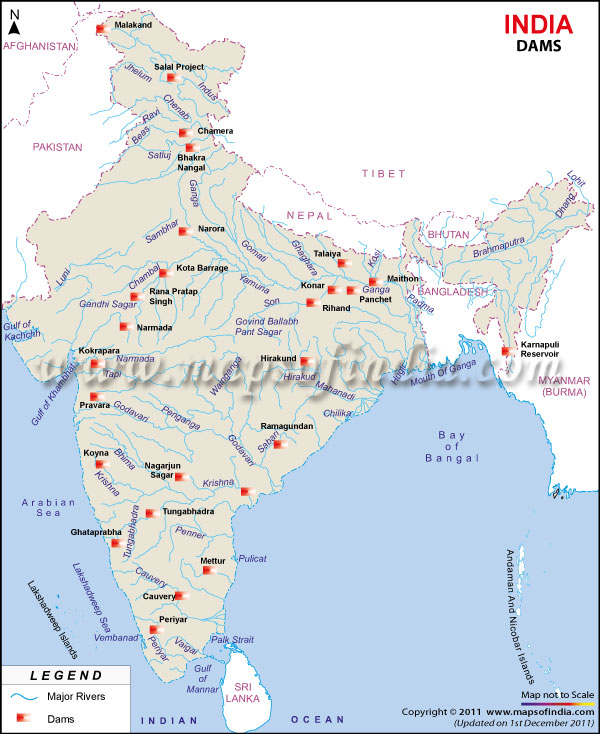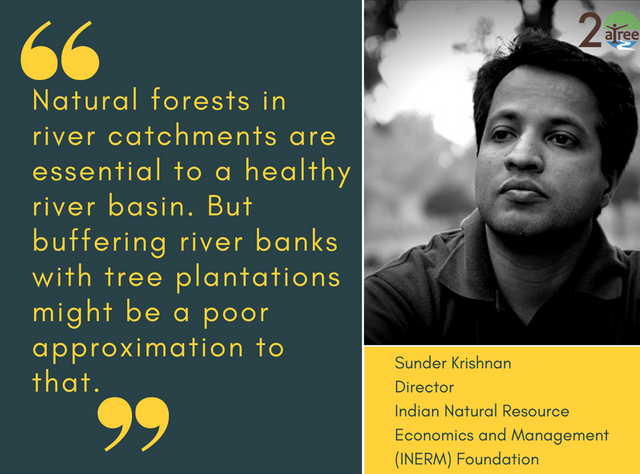8 Questions Every Citizen Should Ask Before Rallying For Rivers
Rally for Rivers is essentially a call to plant trees - billions of them - to create a kilometre-wide tree cover on riversides and a half-kilometre wide stretch on the banks of tributaries. It also urges citizens keen to save India's rivers to give a missed call on a number to show their support for the idea.
To create awareness, Sadhguru Jaggi Vasudev, the founder of Isha Foundation is going to drive across the length of the country - about 7,000 kilometres. Of course, there is talk about how the rally itself will not be eco-friendly with the fuel-inefficient vehicles used, but we're talking here of carbon emissions less than from a Transatlantic flight, something many of us take on our annual vacations.
So, let's address some of the facts that make the rally an important intervention: (1) Our rivers really are dying, (2) Tree planting has many benefits, (3) The public does need to be sensitised to the plight of rivers, (4) Citizen participation in environmental advocacy and action is much desired.
But, what exactly is wrong with our rivers and how did we end up with so many of these problems?
- Our rivers are dying because of unchecked sand mining which degrades riverine ecosystems. It causes rivers to change course, leads to bank erosion and flooding, and affects microorganisms vital to soil fertility. Sand mining also impacts underground aquifers which store large quantities of groundwater, and impedes groundwater recharge.
- The number of dams choking our rivers is increasing. This below map shows the major dams of India, but there are thousands of smaller ones that are threatening the life of our rivers. While dams do provide water and hydroelectricity, they wreak havoc with the ecosystem around rivers, formed over thousands of years.

- Untreated domestic sewage and industrial effluents flow freely into rivers. Since not all industries have effluent treatment plants or are even under the purview of State Pollutions Control Boards, toxic industrial effluents are pumped directly into rivers through pipes.
Unfortunately, none of these problems are addressed by the Rally for Rivers project nor can they can be fixed by planting trees on river banks,
As citizens concerned about the state of our rivers, here are some questions we should all be asking regarding Rally for Rivers before lending it our voice:
What species of trees will be planted and in what density? Monoculture plantations of non-native species like eucalyptus and acacia are not the same as natural forests and they will not save our dying rivers. Plantations also have a higher density of trees than natural forests and could put unnecessary stress on the ecosystem.
What happens to the human settlements in the 1 kilometre buffer zone of rivers? Will people living there be displaced, and have appropriate arrangements been made to rehabilitate and compensate them for loss of land and livelihood?
Who is going to fund this massive effort?
Will companies partnering with Isha Foundation be allowed to use their CSR funds to finance the planting of trees? Will its partners - among others, the Adani Group and ONGC who are already mired in environmental controversies (the former, in India and abroad) - be allowed to shrug off their environmental responsibilities, and get away with pollution and violation of environmental norms in exchange for afforestation?
What of Isha Foundation's own environmental misdeeds? The Foundation has been embroiled in controversies over many of its constructions which, being in environmentally sensitive areas such as wetlands and an elephant corridor, violate environmental norms. The constructions were deemed to 'affect the flora and fauna of that area and also pollute the Noyyal river' with impacts on the whole of western Tamil Nadu. Is Jaggi Vasudev overlooking the makings of an environmental disaster in his own backyard in his effort to secure the future of the country?
Rally for Rivers aims to plant billions of trees along India's river banks. A project of this scale will no doubt have wide ranging impacts on the environment and riverine ecosystems. Has it been subjected to an impact assessment? If so, who conducted the assessment and were the results made available for citizen appraisal before seeking their support?
Do all riversides need forests and will Rally for Rivers employ a one-size-fits-all approach in its afforestation programme? Every river has its own unique ecosystem with flora and fauna to suit the conditions specific to that region, as Prerna Bindra points out. Planting the wrong species of trees along a riverbank could disrupt the complex balance in the ecosystem and turn out to be a drain on already scarce water resources. When we rally for charismatic trees, we ignore grasslands and mangroves that provide a vital ecosystem service. In a country like India, vegetation comes in all shapes and sizes: grasslands, scrub forests and wetlands - each playing a specially-designed role in nature. Alas, they may not all be the fruit bearing, economically viable species preferred by Isha Foundation.
And, of course, the elephant in the room, interlinking of rivers. Is Rally for Rivers a Trojan horse for river linking? So far, the Isha Foundation has been equivocal in its stand on the Government of India's project to interlink India's rivers, at times denouncing it while covertly supporting it on other occasions. River interlinking, besides destroying the unique ecologies of rivers, may have several unforeseen consequences that stand to disrupt the complex cultures that have developed alongside these rivers for centuries. This is not to say anything of the interstate water wars it will give rise to, many instances of which we have already witnessed in the recent past.

What would really help our rivers?
We need more stringent legislation to monitor industrial discharge into rivers. We need to pay heed to our Green Tribunals instead of treating approvals as a rubber stamp that comes with any project. The MoEF needs more power. We need more science in decision-making at all levels. There needs to be better collaboration and consultation with the scientific community before implementing environmental projects, especially those with the potential to affect millions of lives. We as a people need to get used to questioning policies using science as a basis for what we do; not act because we got a WhatsApp forward or because we heard it on TV, but because we have it from a reliable source.
It's important to see rivers for what they are, not as a bunch of blue Lego blocks that can be shifted around neatly at our will, affecting nothing. It’s an unfortunate figure of speech to use here, but perhaps we’re missing the forest for the trees - we’re planting trees along river banks without paying attention to the many greater threats facing our rivers today.
Originally posted by Ierene Francis, the founder of Corvus Bags, an enterprise making cotton bags that look great and can be washed, ironed and reused for years, here
http://www.earthamag.org/stories/2017/9/20/8-questions-every-citizen-should-ask-before-rallying-for-rivers